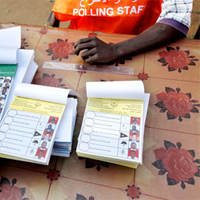

JUBA, Southern Sudan — Sunday, November 1st marked the start of the month-long period of voter registration throughout Sudan, a key step toward the first democratic elections to be held in the country in 24 years, now slated for April 2010. Here in Juba, the capital of southern Sudan, a parade organized by the United Nations Mission in Sudan, or UNMIS, along with Sudanese civil society groups and international NGOs helped to kick off the process. But it is hard to find much reason for celebration in such an occasion, given the enormous risks and threats that the electoral process presents in the coming months for the citizens of Sudan and for the fragile peace between the North and South.
To be sure, the deck is stacked against a free and fair election in five months. Severe impediments to press and personal freedoms and ongoing violence in southern Sudan are just two of the many factors contributing to a climate that, if unchanged, could make elections a trigger for further insecurity and political violence in southern Sudan. At worst, the elections could stir tensions at the local, regional, and national levels that, once provoked, will be very difficult to contain in the CPA’s waning interim period.
Compounding Challenges
At an August press conference in Khartoum, Ray Kennedy, the top U.N. elections official in Sudan, made clear that Sudan’s elections are among the most “complex and challenging on record.” In any nation, elections for six simultaneous offices to be decided in several different ways, with twelve distinct ballots per person in southern Sudan, would be a formidable task for an electoral body. In Sudan, the obstacles of extremely limited infrastructure throughout most of the country and a largely illiterate population compound these issues, and the lagging timeline and multiple postponements in this process are a testament to this.
A civil society leader in Juba recently told me about some of the concerns that he and his colleagues and fellow citizens have about the current voter registration process:
- Voter education and mobilization efforts are not reaching the many southern Sudanese who live in extremely rural areas.
- Distributing resources for the registration process to the many areas of southern Sudan inaccessible by road is a serious challenge.
- Concerns about election security could result in low voter turnout.
International elections advisors had initially recommended that the National Electoral Commission, or NEC, deploy 10,000 static registration teams. However, I spoke with several sources who confirmed that the number of trained registration officials that the NEC will use in the registration process will be significantly lower than this recommendation. All that the NEC has announced thus far is that two teams of three registration officials each will be present in each constituency.
A northern opposition party recently protested the length of the voter registration period, noting that less than 30 days is insufficient to register all voters, particularly in remote areas to be served by “mobile registration centers.” It is hard to imagine how the projected number of 20 million voters will be registered in the span of thirty days, especially with so many tasks—such as the aforementioned transport of registration and voter education materials and training of voter registration officials–incomplete. Although the National Elections Act does not prohibit extending the month-long period voter registration period, this would impinge upon the timeline for candidate nomination and electoral campaigning. With polling set to begin in April, there is little room for error or further delays.
Money is also an issue. The funding for Sudan’s elections falls far short of the budgets for comparably complex elections, such as the 2006 elections in the Democratic Republic of the Congo. As Kennedy told me last week: “With the resources that we have, we are providing all the assistance we can. But resources are limited and the [United Missions in Sudan] as a whole has a range of other areas in which it is supporting CPA implementation.”
The Bigger Picture
Proactive efforts to curb political violence are getting short shrift amid the daunting list of electoral challenges in Sudan. The threat of political violence is real not only in Darfur, where armed conflict and rampant insecurity continue, but also in the South, where more than 350,000 people have been displaced, and more than 2,000 killed, this year. With tensions running high at the local level across the South, and inter-ethnic clashes and Lord’s Resistance Army attacks continuing, the international community should dedicate resources and coordinate efforts to protect civilians and prevent outbreaks of election related violence that could well contribute to a return to full-scale war.
While the international community focuses intensely on elections, many southern Sudanese are looking beyond the election to 2011, when the South holds a self-determination referendum. One U.N. official I spoke with recently noted that, after the four decades-plus history of brutal conflict between Sudan’s North and South, his impression is that much of the population of southern Sudan doesn’t understand the point of national elections: “They fought for the referendum, at the least, the right to choose independence.” This is not to say that citizens lack interest in expressing their will and choosing their elected representatives, just that the “main event” in the South is undoubtedly the referendum.
The voter registration process could serve as a useful barometer for gauging Sudan’s preparedness for the elections. It could also serve as a trial run in which some of the issues that could negatively impact the polling period could be resolved. Alternately, the registration process could expose a reality that, based on my conversations here in Juba, has been felt on the ground for some time: these elections could destabilize already insecure areas as the all-important 2011 referendum draws nearer.

